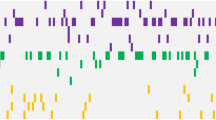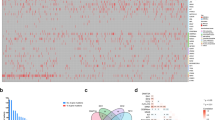Abstract
Epigenetic modifier (EM) genes play important roles in the occurrence and progression of acute lymphoblastic leukemia (ALL). However, the prognostic significance of EM mutations in ALL has not yet been thoroughly investigated. This retrospective study included 205 adult patients with ALL engaged in a pediatric-type regimen. Based on targeted next-generation sequencing, they were divided into EM mutation group (EM-mut, n = 75) and EM wild-type group (EM-wt, n = 130). The EM-mut group showed a higher positive rate of minimal residual disease (MRD) on treatment day24 and before consolidation therapy (P = 0.026, 0.020). Multivariate Cox regression analysis showed that EM-mut was an independent adverse factor for overall survival (OS) and event-free survival (EFS) (HR = 2.123, 1.742; P = 0.009, 0.007). Survival analysis revealed that the OS and EFS rates were significantly lower in the EM-mut group than in the EM-wt group (3-year OS rate, 45.8% vs. 65.0%, P = 0.0041; 3-year EFS rate, 36.7% vs. 53.2%, P = 0.011). In conclusion, EM was frequently mutated in adult ALL and was characterized by poor response to induction therapy and inferior clinical outcomes.



Similar content being viewed by others
Data availability
The data generated during and analyzed in the study are available from the corresponding author on reasonable request.
References
Malard F, Mohty M (2020) Acute lymphoblastic leukaemia. Lancet 395(10230):1146–1162
Stengel A, Schnittger S, Weissmann S et al (2014) TP53 mutations occur in 15.7% of ALL and are associated with MYC-rearrangement, low hypodiploidy, and a poor prognosis. Blood 124(2):251–258
DeAngelo DJ, Stevenson KE, Dahlberg SE et al (2015) Long-term outcome of a pediatric-inspired regimen used for adults aged 18–50 years with newly diagnosed acute lymphoblastic leukemia. Leukemia 29(3):526–534
Testi AM, Canichella M, Vitale A et al (2021) Adolescent and young adult acute lymphoblastic leukemia. Final results of the phase II pediatric-like GIMEMA LAL-1308 trial. Am J Hematol 96(3):292–301
Coccaro N, Anelli L, Zagaria A et al (2019) Next-generation sequencing in Acute Lymphoblastic Leukemia. Int J Mol Sci. ;20(12)
Li J, Dai Y, Wu L et al (2021) Emerging molecular subtypes and therapeutic targets in B-cell precursor acute lymphoblastic leukemia. Front Med 15(3):347–371
Forero-Castro M, Robledo C, Benito R et al (2016) Genome-wide DNA Copy Number Analysis of Acute Lymphoblastic Leukemia Identifies New Genetic Markers Associated with Clinical Outcome. PLoS ONE 11(2):e0148972
Forero-Castro M, Robledo C, Lumbreras E et al (2016) The presence of genomic imbalances is associated with poor outcome in patients with burkitt lymphoma treated with dose-intensive chemotherapy including rituximab. Br J Haematol 172(3):428–438
Roberts KG, Mullighan CG (2015) Genomics in acute lymphoblastic leukaemia: insights and treatment implications. Nat Rev Clin Oncol 12(6):344–357
Chiaretti S, Gianfelici V, Ceglie G et al (2014) Genomic characterization of acute leukemias. Med Princ Pract 23(6):487–506
Chiaretti S, Zini G, Bassan R (2014) Diagnosis and subclassification of acute lymphoblastic leukemia. Mediterr J Hematol Infect Dis 6(1):e2014073
Forero-Castro M, Robledo C, Benito R et al (2017) Mutations in TP53 and JAK2 are independent prognostic biomarkers in B-cell precursor acute lymphoblastic leukaemia. Br J Cancer 117(2):256–265
Chen T, Wei N, Lv W et al (2023) Analysis of RAS gene mutations in adverse events during first induction chemotherapy in childhood acute lymphoblastic leukemia. Transl Pediatr 12(1):56–67
Maćkowska N, Drobna-Śledzińska M, Witt M et al (2021) DNA methylation in T-Cell Acute Lymphoblastic Leukemia: in search for Clinical and Biological meaning. Int J Mol Sci. ;22(3)
Garcia-Manero G, Yang H, Kuang S-Q et al (2009) Epigenetics of acute lymphocytic leukemia. Semin Hematol 46(1):24–32
Liu X-L, Liu H-Q, Li J et al (2020) Role of epigenetic in leukemia: from mechanism to therapy. Chem Biol Interact 317:108963
Wouters BJ, Delwel R (2016) Epigenetics and approaches to targeted epigenetic therapy in acute myeloid leukemia. Blood 127(1):42–52
Lafave LM, Levine RL (2013) Mining the epigenetic landscape in ALL. Nat Genet 45(11):1269–1270
Peirs S, Van der Meulen J, Van de Walle I et al (2015) Epigenetics in T-cell acute lymphoblastic leukemia. Immunol Rev 263(1):50–67
Liu Y-F, Wang B-Y, Zhang W-N et al (2016) Genomic profiling of Adult and Pediatric B-cell Acute Lymphoblastic Leukemia. EBioMedicine 8:173–183
Adnan Awad S, Brück O, Shanmuganathan N et al (2022) Epigenetic modifier gene mutations in chronic myeloid leukemia (CML) at diagnosis are associated with risk of relapse upon treatment discontinuation. Blood Cancer J 12(4):69
Shen Y, Fu Y-K, Zhu Y-M et al (2015) Mutations of epigenetic modifier genes as a poor prognostic factor in Acute Promyelocytic Leukemia under Treatment with All-Trans Retinoic Acid and Arsenic Trioxide. EBioMedicine 2(6):563–571
Bernt KM, Hunger SP, Neff T (2016) The functional role of PRC2 in early T-cell precursor Acute Lymphoblastic Leukemia (ETP-ALL) - mechanisms and opportunities. Front Pediatr 4:49
Schäfer V, Ernst J, Rinke J et al (2016) EZH2 mutations and promoter hypermethylation in childhood acute lymphoblastic leukemia. J Cancer Res Clin Oncol 142(7):1641–1650
Van Vlierberghe P, Palomero T, Khiabanian H et al (2010) PHF6 mutations in T-cell acute lymphoblastic leukemia. Nat Genet 42(4):338–342
Huang K, Dai M, Li Q et al (2020) Early T-Cell Precursor Leukemia has a higher risk of induction-related infection among T-Cell Acute Lymphoblastic Leukemia in Adult. Mediators Inflamm 2020:8867760
Simons A, Shaffer LG, Hastings RJ (2013) Cytogenetic nomenclature: changes in the ISCN 2013 compared to the 2009 Edition. Cytogenet Genome Res 141(1):1–6
Kalina T, Flores-Montero J, van der Velden VHJ et al (2012) EuroFlow standardization of flow cytometer instrument settings and immunophenotyping protocols. Leukemia 26(9):1986–2010
Chen C, Zhou L, Zhu L et al (2022) TNFAIP3 mutation is an independent poor overall survival factor for patients with T-cell acute lymphoblastic leukemia. Cancer Med
Janic D, Peric J, Karan-Djurasevic T et al (2020) Application of targeted next generation sequencing for the mutational profiling of patients with acute lymphoblastic leukemia. J Med Biochem 39(1):72–82
Park K-J, Kim I-S, Yang EJ et al (2020) Mutation analysis in Korean patients with T-cell acute lymphoblastic leukemia. Pediatr Hematol Oncol 37(2):129–139
Pulte D, Jansen L, Gondos A et al (2014) Survival of adults with acute lymphoblastic leukemia in Germany and the United States. PLoS ONE 9(1):e85554
Comet I, Riising EM, Leblanc B et al (2016) Maintaining cell identity: PRC2-mediated regulation of transcription and cancer. Nat Rev Cancer 16(12):803–810
Mittal P, Roberts CWM (2020) The SWI/SNF complex in cancer - biology, biomarkers and therapy. Nat Rev Clin Oncol 17(7):435–448
Wang X, Lee RS, Alver BH et al (2017) SMARCB1-mediated SWI/SNF complex function is essential for enhancer regulation. Nat Genet 49(2):289–295
Meyer SN, Scuoppo C, Vlasevska S et al (2019) Unique and Shared Epigenetic Programs of the CREBBP and EP300 acetyltransferases in Germinal Center B cells reveal targetable dependencies in Lymphoma. Immunity. ;51(3)
Feng J, Li Y, Jia Y et al (2017) Spectrum of somatic mutations detected by targeted next-generation sequencing and their prognostic significance in adult patients with acute lymphoblastic leukemia. J Hematol Oncol 10(1):61
Huether R, Dong L, Chen X et al (2014) The landscape of somatic mutations in epigenetic regulators across 1,000 paediatric cancer genomes. Nat Commun 5:3630
Hou H-A, Tien H-F (2016) Mutations in epigenetic modifiers in acute myeloid leukemia and their clinical utility. Expert Rev Hematol 9(5):447–469
Valerio DG, Katsman-Kuipers JE, Jansen JH et al (2014) Mapping epigenetic regulator gene mutations in cytogenetically normal pediatric acute myeloid leukemia. Haematologica 99(8):e130–e132
Jasielec J, Saloura V, Godley LA (2014) The mechanistic role of DNA methylation in myeloid leukemogenesis. Leukemia 28(9):1765–1773
Shen Y, Zhu Y-M, Fan X et al (2011) Gene mutation patterns and their prognostic impact in a cohort of 1185 patients with acute myeloid leukemia. Blood 118(20):5593–5603
Schär P, Fritsch O (2011) DNA repair and the control of DNA methylation. Prog Drug Res 67:51–68
Jain N, Rossi A, Garcia-Manero G (2009) Epigenetic therapy of leukemia: an update. Int J Biochem Cell Biol 41(1):72–80
Shi Y, Jia B, Xu W et al (2017) Chidamide in relapsed or refractory peripheral T cell lymphoma: a multicenter real-world study in China. J Hematol Oncol 10(1):69
Sun W, Triche T, Malvar J et al (2018) A phase 1 study of azacitidine combined with chemotherapy in childhood leukemia: a report from the TACL consortium. Blood 131(10):1145–1148
Lu BY, Thanawala SU, Zochowski KC et al (2016) Decitabine enhances chemosensitivity of early T-cell precursor-acute lymphoblastic leukemia cell lines and patient-derived samples. Leuk Lymphoma 57(8):1938–1941
Acknowledgements
We thank the clinical data managers of Southern Hospital, Southern Medical University for their contribution to this project.Author contributions: OJW and ZHS contributed to the concept and design of this research. OJW, DSY and DCH brewed and collected data. CZH, CJJ, TBQ, WZW and HZC performed the statistical analyses and XXL, LJ collected and analyzed the data of other independent cohort. ZT and WZX commented critically on an advanced manuscript version regarding the interpretation of the results and the discussion. XL, and LQF offered material support and revised the paper. LQF and ZHS accessed the funding of research. OJW drafted the manuscript. All authors read and approved the final version of the manuscript. OJW and DSY are co-first authors. The data that support the findings of this study are available from the corresponding author upon request.
Funding
This study was supported by the National Natural Science Foundation of China (NSFC, 82170163, 81970147, to HSZ), the National Key Research and Development Program of China (2022YFC2502605, to LX).
Author information
Authors and Affiliations
Contributions
OJW and ZHS contributed to the concept and design of this research. OJW, DSY and DCH brewed and collected data. CZH, CJJ, TBQ, WZW and HZC performed the statistical analyses and XXL, LJ collected and analyzed the data of other independent cohort. ZT and WZX commented critically on an advanced manuscript version regarding the interpretation of the results and the discussion. XL, and LQF offered material support and revised the paper. LQF and ZHS accessed the funding of research. OJW drafted the manuscript. All authors read and approved the final version of the manuscript. OJW and DSY are co-first authors. The data that support the findings of this study are available from the corresponding author upon request.
Corresponding author
Ethics declarations
Ethical approval
All procedures performed in this study involving human participants were in accordance with the ethical standards of the institutional and/or national research committee and with the Helsinki declaration and its later amendments or comparable ethical standards.
Informed consent
This study was approved by the Ethics Committee of Southern Hospital, Southern Medical University and informed consent was obtained from all participants.
Competing interests
The authors declare no competing interests.
Additional information
Publisher’s Note
Springer Nature remains neutral with regard to jurisdictional claims in published maps and institutional affiliations.
Electronic supplementary material
Below is the link to the electronic supplementary material.
Rights and permissions
Springer Nature or its licensor (e.g. a society or other partner) holds exclusive rights to this article under a publishing agreement with the author(s) or other rightsholder(s); author self-archiving of the accepted manuscript version of this article is solely governed by the terms of such publishing agreement and applicable law.
About this article
Cite this article
Ou, J., Deng, S., Ding, C. et al. Mutations of epigenetic modifier genes predict poor outcome in adult acute lymphoblastic leukemia. Ann Hematol (2024). https://doi.org/10.1007/s00277-024-05681-4
Received:
Accepted:
Published:
DOI: https://doi.org/10.1007/s00277-024-05681-4




